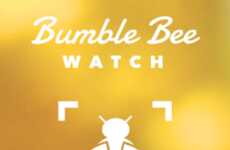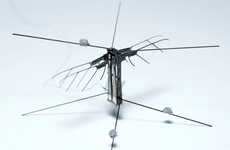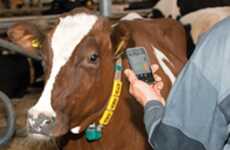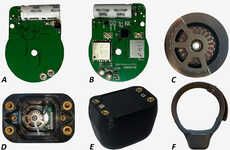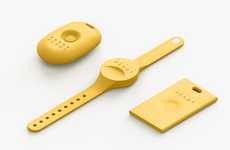
These RFID Trackers for Insects Could Solve the Bee Crisis
Charlotte Joyce Kidd — August 28, 2015 — Eco
Bees are responsible for the pollination of 33% of the world's fruits and vegetables, which makes the current bee crisis a disturbing phenomenon -- but these miniature "backpacks" for bees may be able to solve that.
Exhibiting what's called "colony collapse disorder," mass numbers of bees are dying in a global bee crisis. An Australian research organization has partnered with Intel to solve the bee crisis. Scientists have tagged 10,000 bees in Tasmania by attaching tiny RFID trackers to their backs. Because bees operate in highly organized patterns, the researchers will be able to identify any anomalies and pinpoint the source of the bee crisis.
These black boxes for bees could allow scientists to monitor the patterns and behaviors of all kinds of living organisms. The trackers self-charge with the energy of the bees' vibrations and send a Bluetooth signal to an Intel Edison processor, so the possibility for exploration is limitless.
Exhibiting what's called "colony collapse disorder," mass numbers of bees are dying in a global bee crisis. An Australian research organization has partnered with Intel to solve the bee crisis. Scientists have tagged 10,000 bees in Tasmania by attaching tiny RFID trackers to their backs. Because bees operate in highly organized patterns, the researchers will be able to identify any anomalies and pinpoint the source of the bee crisis.
These black boxes for bees could allow scientists to monitor the patterns and behaviors of all kinds of living organisms. The trackers self-charge with the energy of the bees' vibrations and send a Bluetooth signal to an Intel Edison processor, so the possibility for exploration is limitless.
Trend Themes
1. Bee-tracking Wearables - Developing RFID trackers for bees to solve the bee crisis.
2. Colony Collapse Disorder - Addressing the global bee crisis by studying the patterns and behaviors of bees.
3. Organism Tracking Technology - Using wearable RFID trackers to monitor the patterns and behaviors of various living organisms.
Industry Implications
1. Agriculture - Applying bee-tracking wearables to improve pollination in agricultural practices.
2. Environmental Conservation - Utilizing colony collapse disorder research to protect and preserve bee populations.
3. Healthcare - Exploring the potential of organism tracking technology for medical research and diagnostics.
2.9
Score
Popularity
Activity
Freshness



